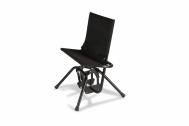Intimate Adaptive Equipment for Spinal Cord Injury Patients
Sex and intimacy are important and, for many people, essential parts of life. As a healthcare professional, you know that when your patient is adjusting to a spinal cord injury, limited mobility, or other disability, sex is often a top concern and source of anxiety. By incorporating intimate adaptive equipment for spinal cord injury patients, you can alleviate these concerns while helping them to achieve a higher quality of life and an improved outlook on the future.
Failure to have this discussion can result in the patient talking down to themselves, dismissing the issue as “extra” or “secondary,” and leaving your care without the tools to support their desired lifestyle. While preparing for this conversation, keep these tips and considerations in mind:
We understand the sexual difficulties, challenges, and worries facing your limited mobility patients as our original adaptive equipment was designed by a C6-C7 quadriplegic with limited arm movement and no trunk or leg muscle control. Our assistive equipment options are designed to facilitate sex that is fun, satisfying, and safe for everyone involved. Our adaptive sex chair, positioning devices, and other accessories are built with your patients in mind, offering:
Why Intimate Assistive Equipment Matters
Spinal cord injuries can impact motor skills, coordination, reflexes, sensation and feeling, and overall mobility. Patients must learn or relearn their bodies, including discovering new sexual positions for limited mobility, building confidence and trust in themselves and their partners, and finding new ways to feel good during intimate encounters. Assistive equipment and sexual mobility aids can help. In addition to providing more support and increased mobility, adaptive equipment for spinal cord injury patients can lead to:- Safer intimate encounters for all partners
- Safer sexual environments without risk of injury or pain
- Increased intimacy lowering the likelihood of divorce or separation
- Overall improved quality of life
- Better mental health from lower stress levels
- And much, much more!
How to Talk to Limited Mobility Patients About Intimate Assistive Equipment
While sex is a normal part of life, sometimes talking about it can be awkward—particularly when your patient is adjusting to a spinal cord injury or other newly limited mobility. Patients are often experiencing intensely negative emotions, which can include grief, shame, anger, embarrassment, or others. It falls to the healthcare professional to bring up the subject of incorporating intimate assistive equipment into everyday routines.Failure to have this discussion can result in the patient talking down to themselves, dismissing the issue as “extra” or “secondary,” and leaving your care without the tools to support their desired lifestyle. While preparing for this conversation, keep these tips and considerations in mind:
- Assess your comfort with discussing sex and intimacy. If you are uneasy, practice talking about sex and intimacy with other groups before speaking with your patient.
- Establish trust before asking sensitive questions.
- Express that you have this conversation with all your patients. It is not specific to only them.
- Use neutral and inclusive terms such as partner instead of wife, husband, boyfriend, girlfriend, etc. This helps to avoid assumptions about your patient’s life, habits, or identity.
- Keep things professional with neutral spoken, body, and posture language.
- Give your patient time to ask questions, clarifications, and process new information. While you may have this conversation multiple times a day, it is a vulnerable moment for your patient.
IntimateRider Adaptive Equipment for SCI Patients Navigating Sex
The best intimate assistive equipment for your patients will vary depending on the severity of their spinal cord injury, mobility limitations, and intimacy goals. Several excellent choices can be found in the IntimateRider family of sex accessibility products.We understand the sexual difficulties, challenges, and worries facing your limited mobility patients as our original adaptive equipment was designed by a C6-C7 quadriplegic with limited arm movement and no trunk or leg muscle control. Our assistive equipment options are designed to facilitate sex that is fun, satisfying, and safe for everyone involved. Our adaptive sex chair, positioning devices, and other accessories are built with your patients in mind, offering:
- Durable constructions and non-skid legs
- Easy foldability for quick storage or travel
- Designs that cause no abrasions, sores, or other pain
- Easy-to-clean materials and covers
- No motor or electric power source required
- And more!
IntimateRider Coverage & Funding Options
Along with navigating sexual intimacy, finances and costs are top concerns for patients with spinal cord injuries. We recognize that purchasing IntimateRider products is a significant investment, and so we offer a variety of coverage and funding options to ensure your patients can access the assistive equipment they need. We accept:- Cash or credit card
- Private, disability, liability, or public insurance, including Medicaid
- Worker’s compensation
- Purchase through a VA hospital
- And more!




